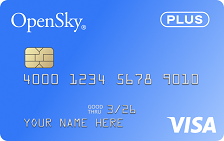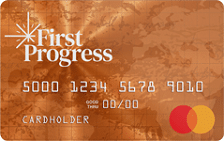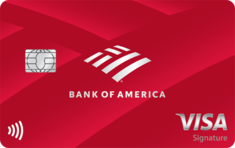Filter Options
×-
-
Unselect all
-
Unselect all
-
Unselect all

Showing 76 Cards
Sort By Column Name:
Current Build Card

Current Build Card
- 0.00% Regular Purchase APR
- 0.00% Cash Advance APR
At a Glance
The Current Build Card is a no annual fee secured card that builds credit while earning up to 7X points and 4% APY on savings. The card features no account minimums, no overdraft fee, and spending insights to help your build credit.
- Best Benefits
- Rates & Fees
- Why Should You Apply?
- Build credit with no minimum deposits and no annual fee
- Up to 4% APY on savings
- Earn up to 7X points on purchases with over 14,000 merchants
- No overdraft fee
- Regular Purchase APR: 0.00%
- Cash Advance APR: 0.00%
- Annual Fee: $0.00
- Foreign Transaction Fee: 3% of the transaction amount in U.S. dollars
- Late Payment Penalty Fee: 3% of any Total Due balances outstanding and past due for two or more billing cycles
- You are new to credit and want an easy way to begin building credit
- You plan on utilizing Current's spending insights to help you save money
- You don't want to pay an annual fee to earn rewards
Self Visa® Credit Card

Self Visa® Credit Card
- 29.24% (Variable) Regular Purchase APR
At a Glance
The Self Visa® Credit Card is a secured credit card that pairs with an existing Self Credit Builder Account. The card has no formal approval process. Instead, hopeful consumers simply need to open a Self account and save over $100 to fund the secured Visa account.
- Best Benefits
- Rates & Fees
- Why Should You Apply?
-
Apply Now: Intro No Annual Fee with the secured Self Visa® Credit Card^ • If you have an active Credit Builder Account, $100 or more in savings progress and satisfying income requirements you may be eligible to receive the secured Self Visa® Credit Card*, without a hard credit check. Criteria subject to change. • Build credit and savings at the same time. • Start with a Credit Builder Account* that reports monthly payments to all 3 major credit bureaus. • At the end of your plan, unlock the savings you built - minus interest and fees. • The secured Self Visa® Credit Card is accepted at millions of locations in the U.S. *Credit Builder Accounts & Certificates of Deposit made/held by Lead Bank, Sunrise Banks, N.A., First Century Bank, N.A., each Member FDIC. Subject to credit approval. The secured Self Visa® Credit Card is issued by Lead Bank or First Century Bank, N.A., each Member FDIC. See Self.inc for details. Subject to ID Verification. Individual borrowers must be a U.S. citizen or permanent resident and at least 18 years old. Valid bank account and Social Security Number are required. All loans are subject to consumer report review and approval. The Secured Self Visa® Credit Card requires an active Self Credit Builder Account and qualification based on other eligibility criteria including income & expense requirements. Criteria subject to change.
^$0 annual fee for the first year only, $25 annual fee thereafter. Variable APR of 28.24%. Offer valid for new customers only.
- Regular Purchase APR: 29.24% (Variable)
- Annual Fee: $25
- Late Payment Penalty Fee: Up to $15
- Return Payment Penalty Fee: Up to $15
- You're serious about raising your credit score
- You already have a Self Credit Builder Account
- You don’t mind the card's $25 annual fee
- You plan to pay your card balance in full every month
Applied Bank® Secured Visa® Gold Preferred® Credit Card
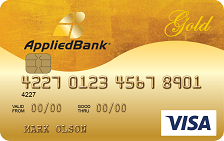
Applied Bank® Secured Visa® Gold Preferred® Credit Card
- 9.99% Fixed Rate Regular Purchase APR
- 9.99% Fixed Rate Cash Advance APR
At a Glance
The Applied Bank® Secured Visa® Gold Preferred® Card offers those with limited credit history or a poor credit score the chance to receive a full-fledged Visa card without the need for a credit check. The card also boasts and impressively low fixed APR on purchases and cash advances – all for the modest annual fee of $48.
- Best Benefits
- Rates & Fees
- Why Should You Apply?
- Better than Prepaid...Go with a Secured Card! Load One Time - Keep On Using
- Absolutely No Credit Check or Minimum Credit Score Required
- Automatic Reporting to All Three National Credit Bureaus
- 9.99% Low Fixed APR - Your Rate Won’t Go Up Even if You Are Late
- Activate Today with a $200 Minimum Deposit - Maximum $1,000
- Increase Your Credit Limit up to $5,000 by Adding Additional Deposits Anytime
- Regular Purchase APR: 9.99% Fixed Rate
- Cash Advance APR: 9.99% Fixed Rate
- Cash Advance Transaction Fee: Either $5 or 5% of the amount of each cash advance, whichever is greater
- Annual Fee: $48
- Foreign Transaction Fee: 3% of the transaction amount in U.S. dollars
- Late Payment Penalty Fee: Up to $38
- Return Payment Penalty Fee: Up to $38
- Minimum Deposit Required: $200
- You have bad credit, limited credit, or no credit history at all
- You want a card that automatically reports to all the major credit bureaus
- You are tired of spending money on reloadable prepaid cards
- You can make a minimum deposit of at least $200
OpenSky® Secured Visa® Credit Card
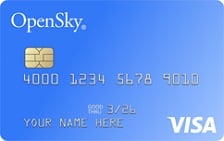
OpenSky® Secured Visa® Credit Card
- 24.64% (variable) Regular Purchase APR
- 24.64% (variable) Cash Advance APR
At a Glance
The OpenSky® Secured Visa® is a secured credit card that offers requires a low minimum deposit and features no credit checks for approval. The card, issued by Capital Bank, provides an easy route to better credit by offering credit limits as low as $200, a moderate fixed-rate APR, and a reasonable $35 annual fee.
- Best Benefits
- Rates & Fees
- Why Should You Apply?
- Earn up to 10% cash back on everyday purchases
- No credit check required – 89% approval rate with zero credit risk to apply!
- Boost your credit score fast—2 out of 3 OpenSky® cardholders see an average increase of 47 points after 6 months
- Track your progress with free access to your FICO® score in our mobile app
- Build your credit history with reporting to all three major credit bureaus: Experian, Equifax, and TransUnion
- Seamless payments—add your card to Apple Pay, Google Pay, and Samsung Pay
- Start with just $200—secure your credit line with a refundable deposit
- Fast and easy application—apply in minutes with our mobile-first experience
- Flexible payment options—pick a due date that works for you
- More time to fund—spread your security deposit over 60 days with layaway
- Join 1.6 million+ cardholders who have used OpenSky® to build better credit!
- Regular Purchase APR: 24.64% (variable)
- Cash Advance APR: 24.64% (variable)
- Cash Advance Transaction Fee: Either $6 or 5% of the amount of each cash advance, whichever is greater.
- Annual Fee: $35
- Foreign Transaction Fee: 3% of each transaction in U.S. dollars
- Late Payment Penalty Fee: Up to $41
- Return Payment Penalty Fee: Up to $25
- Minimum Deposit Required: $200
- You're struggling to get accepted for other secured credit cards
- You don’t have a credit history
- You have bad credit and want to improve your credit score
- You have a large deposit and want a quick pick-me-up for their credit score
- You want access to a useful knowledge base of credit information and resources
GO2bank Secured Visa Credit Card

GO2bank Secured Visa Credit Card
- 22.99% Regular Purchase APR
- 26.99% Cash Advance APR
At a Glance
The GO2bank Secured Visa Credit Card is a basic secured credit card that offers decent value for its no annual fee. The card features a low deposit requirement, fixed APR, and the Visa payment network’s purchasing power.
- Best Benefits
- Rates & Fees
- Why Should You Apply?
- No annual fee
- No credit check to apply
- Fixed-rate APR on purchases
- Regular Purchase APR: 22.99%
- Cash Advance APR: 26.99%
- Cash Advance Transaction Fee: Either $10 or 5% of the amount of each cash advance, whichever is greater
- Foreign Transaction Fee: 3% of the transaction amount in U.S. dollars
- Late Payment Penalty Fee: Up to $39
- Return Payment Penalty Fee: Up to $20
- Minimum Deposit Required: $100
- You have limited credit history but want to establish good credit habits
- You don’t have the money for a significant security deposit
- You prefer mobile banking over branches
- You do't want to pay an annual fee
You've viewed 5 of 76 credit cards
How Do Secured Credit Cards Work?
Secured credit cards are a great option for individuals with no credit history or those trying to rebuild their credit after experiencing financial difficulties. That’s because they require an extra step in the application process. Despite that, secured credit cards function similarly to regular credit cards, with one key difference – the need for a security deposit.
When you apply for a secured credit card, you must provide a cash deposit that serves as collateral for your credit limit. This deposit reduces the risk for the card issuer, as they can use it to cover any unpaid balances in case you default on your credit card payments.
The amount of your security deposit typically determines your credit limit. For example, if you deposit $500, your credit limit will also be $500. It’s important to note that the deposit is refundable as long as you maintain a good payment history and eventually close the account.
Benefits of Secured Cards
When it comes to building or rebuilding credit, secured credit cards offer several advantages that make them a popular options:
- Establish a positive credit history: Making regular, on-time payments and maintaining low credit utilization with a secured credit card can help you build a strong credit profile. This is crucial for obtaining future credit cards, loans, and mortgages and ensuring you get the lowest rate possible.
- Access to credit card benefits and perks: Secured cards let you enjoy the conveniences and perks of traditional credit cards. They can be used for online purchases, car rentals, and hotel bookings. Some secured credit cards even feature rewards programs, allowing you to earn points or cash back on eligible purchases.
- Develop healthy financial habits: Since a cash deposit is required to secure the credit limit, individuals are more likely to spend responsibly and avoid accumulating excessive debt. This valuable lesson in financial discipline and budgeting can contribute to your long-term financial well-being.
Chance to Upgrade
Perhaps the best benefit of secured credit cards is the opportunity to upgrade to unsecured credit after boosting your credit and demonstrating positive credit behaviors.
Some secured credit cards offer automatic upgrades. For example, Discover may upgrade the Discover it Secured Card to a Discover it Chrome Card in as little as six months. However, not every credit card issuer offers a path to upgrading, so it’s important to consider your future credit plans before applying.
Key Features to Consider When Choosing a Secured Card
When choosing a secured credit card, it’s essential to consider several key features to ensure it aligns with your financial needs and goals. Here are the key features to look for:
Eligibility Requirements
- Always ensure you meet the eligibility requirements before applying for a secured credit card.
- Some banks have credit score requirements, while others may have strict rules regarding customer status.
- International students should pay attention to banks’ acceptance policies, as some may require a Valid Social Security Number (SSN) while others accept an Individual Taxpayer Identification Number (ITIN).
Affordable Security Deposit
- The security deposit for secured credit cards acts as collateral for the credit line.
- Many secured credit cards require a deposit of around $200 to $300, while some credit unions may require a lower deposit.
- Consider a card with a low deposit requirement if affordability is a concern.
Manageable Fees
- Most secured cards come with various fees, including annual, late, and APR fees.
- Aim for a secured card with an annual fee of $50 or less, and be mindful of the additional fees for essential services.
Grace Period
- Look for a secured card that offers a grace period between the statement date and the due date to avoid accruing interest on purchases.
Credit Bureau Reporting
- Ensure that the secured card reports to the major credit bureaus (Experian, Equifax, and TransUnion) to build and improve your credit score.
Chance to Upgrade
- Some secured cards offer paths to upgrading to unsecured cards after a certain period, which is beneficial for future credit plans.
Considerations When Choosing a Secured Card
- Automatic upgrades: Some secured cards offer automatic upgrades to unsecured cards after a certain period, providing a path to improving credit standing.
- Building credit: Secured cards are primarily for building credit, so ensure the card reports to major credit bureaus for effective credit building.
- Rewards: While some secured cards offer rewards, the value of these rewards may be minimal compared to the focus on building credit and obtaining a lower APR.
By considering these key features, you can make an informed decision about choosing a secured credit card that best suits your financial situation and goals.
Tips for Using Secured Credit Cards Responsibly
Using a secured credit card responsibly is crucial for building credit and maintaining a healthy financial profile. Here are some tips to help you make the most of your secured credit card:
- Pay your balance in full and on time: Make it a priority to pay your credit card balance in full each month. This not only helps you avoid interest charges but also demonstrates responsible credit behavior to lenders.
- Keep your credit utilization low: Aim to keep your credit utilization ratio below 30%. This means using only 30% or less of your available credit. High credit utilization can negatively impact your credit score, so keep your spending in check.
- Monitor your credit activity: Regularly review your credit card statements and credit reports to ensure all charges are accurate. Monitoring your credit activity lets you immediately detect errors or potentially fraudulent activity.
- Avoid cash advances: Cash advances on your secured credit card often have high fees and interest rates. These transactions should be avoided unless absolutely necessary.
- Upgrade to an unsecured credit card: Once you’ve established a positive credit history, inquire with your card issuer about upgrading to an unsecured credit card. This transition can provide you with increased credit limits and the return of your security deposit.
Secured Credit Card Myths
There is so much information online about secured credit cards. How do you weed out the myths? Financial products may change over time. Credit cards today differ from how they might have been 50 years ago. Along the way, secured credit cards may have picked up a few common myths. Let’s debunk them.
Myth: Applying for a new credit card won’t affect my credit score
Fact: Applying for new credit impacts your credit score, regardless of approval or usage.
Myth: Paying less than the monthly minimum due on a credit card won’t count as a missed payment
Fact: Any payment below the minimum amount could be reported as a missed payment, affecting your credit score.
Myth: Closing unused credit card accounts with zero balances boosts credit score
Fact: Keeping unused credit card accounts open can increase total available credit, positively impacting credit score.
Myth: Carrying a credit card balance helps build credit history
Fact: Paying off the balance in full each month is beneficial for credit history and may increase credit score.
Myth: Having many credit cards improves credit score
Fact: Credit bureaus prefer a variety of credit types, not just multiple credit cards.
Myth: All interest rates on credit card balances are the same
Fact: Different balances may have different interest rates, and payments above the minimum are applied to the highest interest rate.
Myth: High credit limits on credit cards are not beneficial
Fact: Managing high credit limits with low balances can lower debt-to-credit ratio, potentially boosting credit score.
Alternatives to Secured Cards
Not sure if a secured credit card is right for you? There are several alternative options to consider instead of secured cards, including the following:
Debit Cards
Debit cards are popular options for those who prefer convenience and want a safer alternative to carrying cash. Debit cards are payment cards linked to a checking or deposit account. With debit cards, you can only spend what you have in the bank. Because of this, debit cards typically don’t build credit.
That’s not to say that you can’t build credit with a debit card. Banks are increasingly issuing credit-builder debit cards that build credit with every transaction. These cards operate like charge cards in that whatever you purchase is immediately paid off using the account’s funds. When the credit-builder card pays itself back from your account, it reports those payments to the major credit bureaus.
Credit-Builder Loans
Credit-builder loans are designed to help you establish a good payment history. The money you “borrow” is not directly given to you. Instead, it is held in a savings account on your behalf while you repay the loan in monthly installments. Once you repay, the money is released, and your credit report reflects a paid-off loan.
Secured or Debit Card: Which Is Best for You?
Secured credit cards can be a valuable tool for improving your financial standing if you have poor or no credit. By using them responsibly, you can boost your credit score as they report your activity to the three major credit bureaus in the United States. On the other hand, prepaid cards do not report your activity, so they won’t have an impact on your credit score.
If you don’t currently have the necessary credit to qualify for an unsecured credit card, secured credit cards can be a good option. While unsecured cards may offer more attractive APR and benefits, their application process is often stricter, requiring evaluation of personal income, assets, and other factors. However, with time and responsible credit use, you can work towards qualifying for unsecured cards as well.
FAQs
Here are the most commonly asked questions about secured credit cards:
Many secured credit cards do not earn rewards. This is partially because secured cards are designed to help teach sound credit fundamentals and boost credit scores through on-time payments. The other major reason why most secured cards lack rewards is that most applicants place small initial deposits, so the credit limit isn’t sufficient for the kind of spending rewards cards require to be worthwhile.
That said, there are a handful of cards that require a security deposit and offer rewards. The most notable of these cards is the Discover It Secured. The card is like the Discover It chrome Card in that it earns 2% back on gas and dining.
It also comes with the same Discover Cashback Match after year one. The only difference with the secured version is that it requires a deposit of at least $200.
Two other secured cards with rewards are the SKYPASS Visa Secured Card and the LATAM Visa Secured Card. Both cards earn airline miles through purchases, with additional discounts on flights with Korean Air and LATAM, respectively.
As with other rewards credit cards, there are no limits to the total amount of points you can earn with a rewards secured credit card.
Getting more than one secured card might seem counterproductive, but it can quickly boost your credit score. More open credit accounts means the chance to add more on-time payments to your credit report. Multiple secured card accounts will also raise your available credit limit, allowing you to reduce your credit utilization rate. Those two factors comprise the majority of what makes up your FICO credit score.
Since these cards require a deposit that also acts as the credit limit, you can always increase your credit line with an additional deposit. Most issuers have rules about how credit limit increases occur. These may include applications, extra checks, or simply transferring more funds.
Banks and lenders usually require a minimum deposit of around $200 to open a secured account. Some credit unions need as little as $50, on the other hand. On the flip side, most secured cards have a maximum initial deposit of between $3,000 and $5,000.
Again, this amount differs based on the bank and type of secured card. Business secured cards, for instance, have much higher maximum despots – sometimes up to $35,000 or more.
The amount you deposit depends entirely on your unique situation. Those new to credit should start with a small deposit. Once they get the hang of paying the balance in full (and on time), they can increase their deposit as they wish.
Those with higher credit scores can use the flexible deposits on secured cards to quickly increase their available credit. This, in turn, can promptly decrease their credit utilization rate, leading to rapid increases in their credit score.
Like rewards, most credit cards that require a deposit do not earn interest on that deposit. Typically, deposits are held in a joint account by a card issuer. There the deposits sit until the cardholder either closes the account, or the bank claims the money due to non-payment.
Some credit union secured cards, however, do earn interest. While any interest cards accumulate will not be enough to retire on, it is still an excellent perk worth looking out for.
Yes. As with any other form of credit card, you can be denied a secured credit card. Despite the looser restrictions, card issuers wills till look at things like your employment, income, your payment history, and other relevant materials when you apply. If your credit history is full of late payments, you might struggle to get a secured card.
In those cases, unsecured cards like the Group One Platinum Card might make sense. These cards offer an unsecured line for credit for use in the Horizon outlet, which provides a wide selection of products, goods, gifts, and more. While not a Visa or Mastercard, they are still credit cards that report to the major credit bureaus. This can help you rebuild your credit with on-time payments.
No. While some secured credit cards from credit unions may offer a credit line increase after a history of on-time payments, there are no credit cards that offer a security deposit that can be paid over time.
There are no secured American Express credit cards. American Express and Chase are two of the largest card issuers that don’t offer secured credit cards.
- You must be 18 years or older to apply for a secured credit card
- Most credit card companies mail cards out with a timeframe of 7 to 10 business days before arrival. This is good rule to follow when expecting a new credit card in the mail, regardless of the issuer.
- The graduation period of a secured credit card differs from bank to bank. Some issuers, like Discover or Capital One provide graduation in a year or less, while others, like Merrick Bank, may increase your credit limit in as little as 7 months.
- Secured credit cards require a security deposit, typically between $200 to $5,000. Some card issuers offer deposits as low as $50, however, so shoip around if money is tight.
- There are no guaranteed credit cards, but a secured card is much easier to get than an unsecured credit card. This is because the security deposit doubles as the credit line, meaning you are more attractive to lenders.
- You can, yes, but it will only add a debit to your account balance and will not result in a negative credit utilization.
- You can’t pick up a secured credit card in Walmart, Target, or any other store. Secured credit cards require a credit application. For this reason, you can’t purchase a secured card like you would a prepaid or gift card.
- You pay off a secured card in the same way as any other credit card: online or via the bank’s mobile app, or, where applicable, in branch.
- Paying off a secured credit card will just refresh the credit line. You will not receive your security deposit back unless you close the card account and have a $0 balance.
- Yes, at least for a soft inquiry. Most secured cards require a hard pull, or a full pull of your credit report. Some, however, do not require a credit check, such as the OpenSky Visa.
- In some cases, yes. Check the terms and conditions of every credit card before you apply to fully understand what transactions are allowed.
- No. You cannot go over your credit limit with a secured card. Trying to purchase something over your credit limit will result in the sale being denied.
- Most likely no – even if you apply in branch.
- No. A secured credit card is a loan, so the security deposit cannot be garnished for child support or other judgements.
- A secured credit card is a form of loan, a secured loan. But yes, you can still receive a loan with a secured credit card. In fact, if you are new to credit as secured cards can help you establish a new type of credit, helping to boost your credit mix.
Conclusion
Secured credit cards are powerful tools for building credit safely and effectively. By using them responsibly, you can establish a positive credit history, learn financial discipline, and gradually transition to unsecured credit cards with more favorable terms. Remember to research and compare different secured credit card options, consider fees and interest rates, and follow responsible credit practices. With dedication and mindful credit management, secured credit cards can pave the way to a brighter financial future.
Editorial Disclosure – The opinions expressed on BestCards.com's reviews, articles, and all other content on or relating to the website are solely those of the content’s author(s). These opinions do not reflect those of any card issuer or financial institution, and editorial content on our site has not been reviewed or approved by these entities unless noted otherwise. Further, BestCards.com lists credit card offers that are frequently updated with information believed to be accurate to the best of our team's knowledge. However, please review the information provided directly by the credit card issuer or related financial institution for full details.

